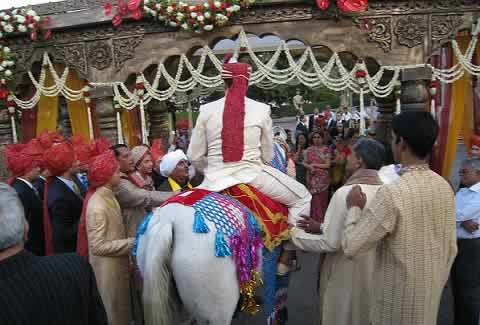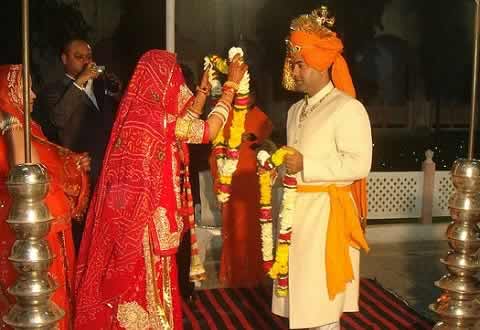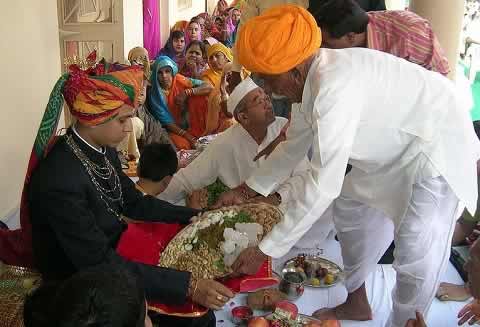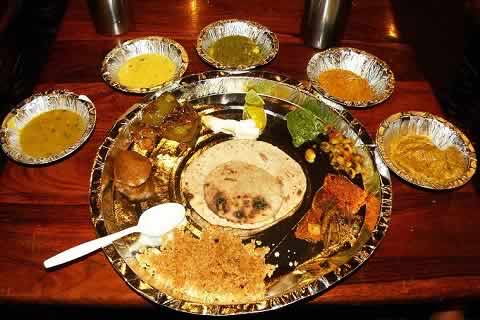All the Rajasthani Weddings have some common pre and on marriage ceremonies :
» Pre – Marriage Ceremonies :
Engagement : In this Ceremony the Bride to be and the Groom to be exchange rings as part of the acceptance of each other. this is followed by the blessings of the elders and the pre marriage feast for the relatives and friends.
Ganpati Sthapana : Before the Marriage Begins, the idol of the Lord Ganesha – the god of Intelligence, is brought in the Home of the Groom and kept inside the Temple. Blessings are taken from the Lord for a successful marriage.
Pithi Dastoor or haldi ceremony : This Custom involves the application of Turmeric/ Haldi paste on the hands and feet of the Bride/ Groom in their respective homes. As per the Custom the Bride and the Groom are not allowed to step outside the home after this ceremony, till the marriage is over.
Mehfils or Sangeeth : A day before the marriage, a mehfil/ small party is set in the premises of the home of either of Bride and Bridegroom. Members of both families gather to see the famous dance of Rajasthan called the Ghoomar Dance. Even the home members dance in this function. The Mehfil is followed by a Dinner for both the families.
Janeva Ceremony : In this Ceremony, on the morning of the marriage, the Groom is dressed in saffron robes. He is supposed to perform a Havan ( prayer before Fire God), in which he wears a pious thread. It signifies that after wearing this thread, the boy will either seek renunciation from the worldly affairs or enter the Married Life.
Palla Dastoor : On the wedding day, in the early morning hours, the Grooms Father and Brothers come to the Brides house with Gifts of Jewellery and Wedding dress for the Bride.
Toran : The entrance of the brides home is decorated with flowers and straw and this is called as Toran. The groom hits the Toran with a Straw to ward off the Evil Eye from his to be Bride. This Ceremony is called the Toranchar.
Mehindi-Intrical bridal Mehindi Tatoos :Intricate bridal henna design is applied on the bride’s hands and feet. Other females of the bride and groom’s wedding party also apply henna tattoos.
Baraath-bridegroom wedding procession:

“Baraat” is the bridegroom’s wedding procession. Sitting on a female horse, the groom sets off for the wedding venue. The “Baraat” is accompanied by a wedding band and the wedding party dances on the way to the marriage venue. The groom and his “Barat” visit a temple before reaching the wedding Mandap. The wedding “Baraat” is welcomed by male relatives of the bride. Key members of the “Baraat” wear a colorful Marwadi turban called “Safa”.
In traditional Rajasthani Rajput marriages the wedding “Baraat” is made up of only men and usually there is no dancing.
Jaimala or varmala(exchanging garlands):

When the bride and groom meet, they exchange garlands made of flowers. After the “Jaimala” marriage custom, the couple is led to the wedding “Mandap” (altar).
Granthi Bandhan : After applying some turmeric paste on the Girls hand, the father of the Bride gives her hand in the hands of the Groom. This signifies that he is passing on his responsibility to the Groom. This Ritual is called Kanyadan – Kanya meaning Daughter and Daan meaning Giving.
Paani Grahan : In this Ceremony, the Groom takes the Right Hand of the Bride in his hand thus taking her responsibility for lifetime.
Phera Ceremony : After taking the Brides responsibility, the Bride and the Groom go round the fire seven times. This act is called Pheras. ( in some four pheras are taken in the Brides home and the Rest of the three pheras are done in the Grooms house after the Bride has undergone the Bidai Ceremony).
Satapadi : After going round the fire, the Bride and the Groom now take Seven steps together towards the Sun Gods Direction. It signifies that from now onwards both of them will walk together in all the situations of life – wether good or bad. Now both proclaim themselves as Man and Wife.
Aanjhalabharai and pharavani:

Just before the newly married couple leave the wedding “Mandap”, the bride’s father-in-law gives her a bag if money. This is the “Aanjhala Bharaai” custom. “Paharavani” is a custom where the groom is teased and made to recite songs by ladies in the bride’s family. This is followed by the bride breaking an earthen pot which symbolizes a break from her parent’s family and her new start in her husband’s home.
Bidai : After all the ceremonies are done, the Girl/ Bride is handed over to the Boy/Groom. Now she is sent along her better half by her relatives.
Marwadi Wedding Reception
Marwari Wedding Receptions are usually held a day after the wedding. Traditional Rajasthani and Marwadi food are served at the Marriage Reception.
 Food Served at Marwari and Rajput Marriages.
Food Served at Marwari and Rajput Marriages.
- Marwari “Bania” marriages serve only vegetarian food and no alcohol is consumed at their wedding. This no alcohol or non-vegetarian food custom is usually adhered to by members of the Marwadi (“Mewari”) “Bania” community, including Khandelwal, Maheshwari, Agarwal, Poddars, Oswals, Mahawar Vaishya, etc.
- Non-vegetarian food is served at Rajasthani Rajput weddings, except Vaishnav Rajputs.
- Popular Marwadi Wedding food includes traditional Marwari dishes of “Daal-Bati Churma”, “Gatte Ki Kadhi” “Rajasthani or Masala Baati”, “Khatta”, “Bafla Bati”, “Besan Cheela Raita”, “Shahi Kachori”, “Mirchi Bada”, “Missi Roti”, “Moon Dal Halwa”, “Jalebi”, “Churma Laddoo”, “Jhajariya”, “Dil-Khushaal”, “Mohanthal”, etc.
- Since many Marawadi weddings take place late at night, most non-family guest members have their dinner before the marriage ceremony.
Marwadi and rajasthani Wedding Clothes and Jewelry for the Bride and GroomFor Marwadi brides, Red is an auspicious color. Marwari brides usually wear a red bridal saree or “Ghagra Choli” or “Lahanga”. In addition to red, orange, gold, cream and pink are also a part of the Marwari bride’s wedding trousseau.
A Marwadi bride’s bridal jewelry consists of a choker around the neck (“Aad” or “Timaniyaan”), gold ornament between the partings of her hair (“Rakhdi”), nose ring (“Nath”), earrings, marriage bangles (“Chooda” or “Poonchies”), ornaments above her elbow (“Baju”), gold jewelry around the ankles (“Pajeb”) and gold toe ring (“Bicheya”)
Traditional Marwadi grooms wear a “Sherwani” or “Achkan” with a “Dupatta” and Rajasthani “Jooties” (shoes). On their head, they wear a “Pagdi/Safa” (turban) and a “Shera”. Rajput bridegrooms from Rajasthan usually carry a sword for their wedding.


